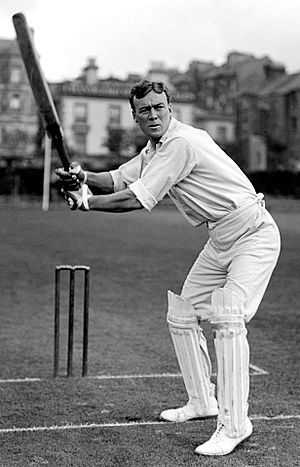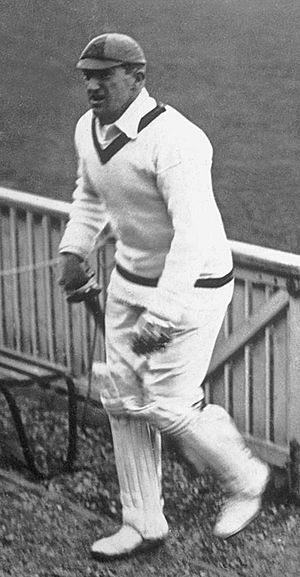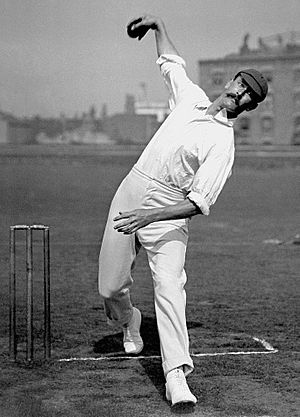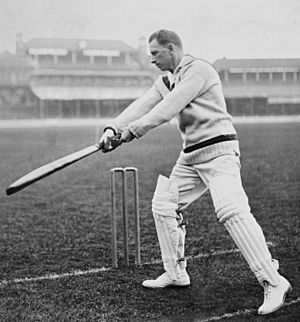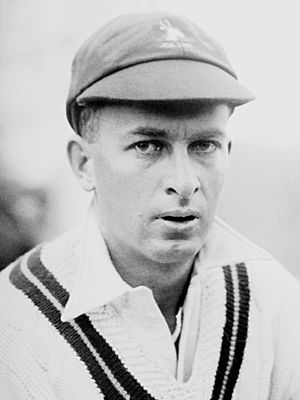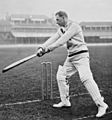South Africa national cricket team facts for kids
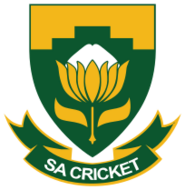 |
|||||||||||||
| Nickname(s) | Proteas | ||||||||||||
|---|---|---|---|---|---|---|---|---|---|---|---|---|---|
| Association | Cricket South Africa | ||||||||||||
| Personnel | |||||||||||||
| Test captain | Temba Bavuma | ||||||||||||
| One Day captain | Temba Bavuma | ||||||||||||
| T20I captain | Aiden Markram | ||||||||||||
| Coach | Shukri Conrad | ||||||||||||
| History | |||||||||||||
| Test status acquired | 1889 | ||||||||||||
| International Cricket Council | |||||||||||||
| ICC status | Full member (1909) | ||||||||||||
| ICC region | Africa Cricket Association | ||||||||||||
|
|||||||||||||
| Tests | |||||||||||||
| First Test | v |
||||||||||||
| Last Test | v |
||||||||||||
|
|||||||||||||
| World Test Championship appearances | 3 (first in 2019–2021) | ||||||||||||
| Best result | Champions (2023–2025) | ||||||||||||
| One Day Internationals | |||||||||||||
| First ODI | v |
||||||||||||
| Last ODI | v |
||||||||||||
|
|||||||||||||
| World Cup appearances | 9 (first in 1992) | ||||||||||||
| Best result | Semi-finals (1992, 1999, 2007, 2015, 2023) | ||||||||||||
| Twenty20 Internationals | |||||||||||||
| First T20I | v |
||||||||||||
| Last T20I | v |
||||||||||||
|
|||||||||||||
| T20 World Cup appearances | 9 (first in 2007) | ||||||||||||
| Best result | Runners-up (2024) | ||||||||||||
| Official website | https://cricket.co.za/ | ||||||||||||
|
|||||||||||||
| As of 22 July 2025 | |||||||||||||
The South Africa men's national cricket team, also known as the Proteas, plays for South Africa in international cricket. The team is managed by Cricket South Africa. South Africa is a full member of the International Cricket Council (ICC). The team's nickname, Proteas, comes from South Africa's national flower, the Protea cynaroides, also called the "King Protea". South Africa is currently the World Test Champions.
South Africa started playing first-class cricket and international matches in 1888–89 when they hosted an England cricket team. At first, the team wasn't as strong as Australia or England. But with more experience, they became a strong team by the early 1900s. They played regularly against Australia, England, and New Zealand until the 1960s.
During this time, many people around the world were against South Africa's apartheid policy, which separated people by race. Because of this, the ICC stopped South Africa from playing international cricket in 1970. When the ban happened, South Africa's team was considered one of the best in the world.
The ban ended in 1991. After that, South Africa played against teams like India, Pakistan, Sri Lanka, and the West Indies for the first time. Since coming back, the team has been very strong. They have often been ranked number one in the world. South Africa is also very successful in ODI cricket, winning more than 60% of their games. They won their first major ICC trophy, the 1998 Champions Trophy, and a gold medal at the 1998 Commonwealth Games. South Africa won the 2023–2025 ICC World Test Championship by beating Australia in the final.
As of July 2025, the team is ranked 5th in ODIs, 2nd in Tests, and 5th in T20Is.
Contents
Team History
Early Days of Cricket in South Africa
European settlers arrived in southern Africa in 1652, starting the Cape Colony. Later, the British took control, and with them came the game of cricket. The first recorded cricket match in South Africa was in 1808 in Cape Town.
The oldest cricket club in South Africa is the Port Elizabeth Cricket Club, started in 1843. By the late 1840s, cricket had spread beyond Cape Colony. In 1876, Port Elizabeth started the "Champion Bat" competition for South African towns.
In 1888, Sir Donald Currie sponsored the first English team to visit South Africa. This tour marked the beginning of both first-class cricket and Test cricket in South Africa. Currie also donated the Currie Cup, a trophy for a national championship.
First Test Matches
In 1889, South Africa became the third country to play Test cricket, playing against England. The first match was in Port Elizabeth, led by Owen Dunell. A second Test was played in Cape Town. These early matches were not officially called "Tests" until South Africa joined the Imperial Cricket Conference in 1906.
The early South African team was not very strong. They lost their first ten Tests and had only one draw in their first eleven matches. Their first Test win against England came in 1906, 17 years after their first match. A tough period was the English tour of 1895–96, where South Africa lost all three Tests badly.
Becoming a Strong Team
In the early 1900s, South Africa developed a strong cricket team. Players like Jimmy Sinclair, Dave Nourse, Aubrey Faulkner, and Reggie Schwarz became well-known. The team became famous for its spin bowlers, especially those who bowled the "googly" – a special type of spin delivery. Reggie Schwarz was a pioneer of this bowling style.
In 1906, England toured South Africa for a 5-match Test series. South Africa, led by their googly bowlers, surprisingly won the series 4–1. This series showed that South Africa was now a major force in international cricket. The MCC (Marylebone Cricket Club) then invited South Africa to tour England in 1907 for official Tests.
South Africa continued to do well, winning another series against England in 1909–10. In 1910–11, they toured Australia for the first time. Australia was considered the best team then. South Africa lost the series but achieved their first-ever overseas Test victory against Australia.
A triangular tournament was held in England in 1912, involving England, Australia, and South Africa. South Africa finished last, as some of their key players were getting older or had retired. However, this tournament saw the debut of Herbie Taylor, who became one of the best batsmen of his time.
In 1913–14, England visited South Africa. South Africa lost the series, but Herbie Taylor showed amazing batting skills, scoring many runs against a very strong English bowling attack.
Between the World Wars
After World War I, international cricket slowly returned. In the 1930s, a new group of talented South African players emerged, especially batsmen like Bruce Mitchell, Dudley Nourse, and Eric Rowan. This team was also notable because it included players from different backgrounds, not just British.
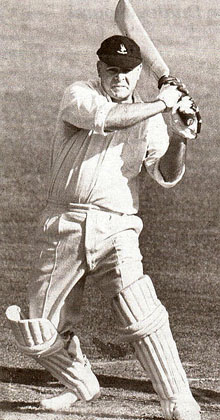
The Apartheid Era and Ban
South Africa continued to play regularly against England, Australia, and New Zealand until 1970. However, because of South Africa's apartheid laws, which enforced racial segregation, only white players could play Test cricket for South Africa.
The Anti-Apartheid Movement led the ICC to ban South Africa from international cricket in 1970. This meant many talented players like Graeme Pollock, Barry Richards, and Mike Procter could not play Test cricket for most of their careers. Some future stars, like Allan Lamb and Robin Smith, even went on to play for England.
Return to International Cricket
The ICC brought South Africa back into Test cricket in 1991. Their first international match since 1970 was a One-Day International against India in Calcutta on November 10, 1991. They lost that match. South Africa's first Test match after the ban was against the West Indies in April 1992, which they also lost.
Since their return, South Africa has had mixed results. They hosted the 2003 Cricket World Cup. The teams of the 1990s, with players like Allan Donald, Shaun Pollock, Gary Kirsten, Jacques Kallis, and Hansie Cronje, were very strong. However, they gained a reputation for "choking" in big tournaments, often reaching the semi-finals of the Cricket World Cup but not making it to the finals.
Their biggest international win was the first Champions Trophy in 1998. They also won a gold medal at the 1998 Commonwealth Games.
The 21st Century Proteas
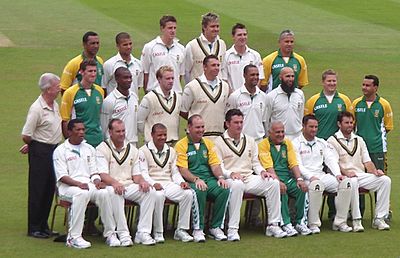
In the 2003 Cricket World Cup, South Africa was a favorite but was knocked out early due to a mistake in calculating runs needed in a rain-affected game. After this, Shaun Pollock stepped down as captain, and Graeme Smith took over.
Later, Ashwell Prince became the first non-white man to captain the South African Test team in 2006. In 2016, a new rule was introduced to ensure the team had an average minimum of six Black players, with two being Black African, in matches throughout the season.
With new talented players like AB de Villiers and Hashim Amla, South Africa's cricket team climbed the ICC rankings. In 2012, they toured England and won the series, becoming the world's number one Test team. Eight days later, they became the first team to be ranked number one in all three formats of the game (Tests, ODIs, and T20Is).
While dominant in Tests, their performance in ODIs and T20Is was less consistent. They continued to struggle in major tournaments, reinforcing their "chokers" reputation. After Graeme Smith retired, Hashim Amla became the Test captain.
Tournament History
South Africa has a history of not winning major world cups, which has been a source of frustration for fans.
- In the 1992 Cricket World Cup, they needed 22 runs from 13 balls in a semi-final when rain stopped play. After the delay, they were left needing 22 runs from just one ball, which was impossible.
- In 1996, they were knocked out in the quarter-finals.
- In 1999, they lost to Australia in the semi-final in a tied match. Australia advanced because they had finished higher in the group stage.
- In the 2003 Cricket World Cup, which they hosted, they failed to get past the group stage due to a miscalculation in a rain-affected game.
- In the 2007 Cricket World Cup, they reached the semi-finals but were bowled out for their lowest World Cup score by Australia.
- In the 2011 Cricket World Cup, they topped their group but lost to New Zealand in the quarter-final after a dramatic batting collapse.
- Their biggest heartbreak came in the 2015 Cricket World Cup semi-final, where they lost to New Zealand in a close, rain-affected match.
- In the 2019 Cricket World Cup, South Africa had a tough tournament and did not qualify for the knockout stages.
- In the 2023 Cricket World Cup, South Africa reached the semi-final but lost to Australia.
Despite these challenges, South Africa holds the record for the highest successful run chase in One-Day Internationals. They scored 438 runs to win against Australia in an amazing match on March 12, 2006. Many consider this the greatest One-Day International ever played.
In the 2024 ICC Men's T20 World Cup, South Africa reached the final without losing a match, beating Afghanistan easily in the semi-final. This was their first time in an ICC final. However, they lost to India by 7 runs. In 2025, South Africa won the World Test Championship final by beating Australia, becoming the world Test champions.
ICC World Test Championship
| Year | Position | Matches Played | Won | Lost | Drawn | Tied | Final Position |
|---|---|---|---|---|---|---|---|
| 2019–21 | 5th | 13 | 5 | 8 | 0 | 0 | 5th |
| 2021–23 | 3rd | 15 | 8 | 6 | 1 | 0 | 3rd |
| 2023–25 | 1st | 13 | 9 | 3 | 1 | 0 | 1st (Champions) |
ICC Cricket World Cup
| World Cup Record | ||||||||
|---|---|---|---|---|---|---|---|---|
| Host and Year | Round | Position | Played | Won | Lost | Tied | No Result | Squad |
| Not eligible due to apartheid ban | ||||||||
| Semi-finals | 4th | 9 | 5 | 4 | 0 | 0 | Squad | |
| Quarter-final | 5th | 6 | 5 | 1 | 0 | 0 | Squad | |
| Semi-finals | 3rd | 9 | 6 | 2 | 1 | 0 | Squad | |
| Group Stage | 9th | 6 | 3 | 2 | 0 | 1 | Squad | |
| Semi-finals | 4th | 10 | 6 | 4 | 0 | 0 | Squad | |
| Quarter-final | 5th | 7 | 5 | 2 | 0 | 0 | Squad | |
| Semi-finals | 4th | 8 | 5 | 3 | 0 | 0 | Squad | |
| Group Stage | 7th | 9 | 3 | 5 | 0 | 1 | Squad | |
| Semi-finals | 3rd | 10 | 7 | 3 | 0 | 0 | Squad | |
| Qualified as co-hosts | ||||||||
| Total | 0 Titles | - | 74 | 45 | 26 | 1 | 2 | - |
T20 World Cup
Champions Trophy
Commonwealth Games
| Commonwealth Games Record | |||||||||
|---|---|---|---|---|---|---|---|---|---|
| Year | Round | Position | Played | Won | Lost | Tied | No Result | Squad | |
| Champions | 1st | 5 | 5 | 0 | 0 | 0 | Squad | ||
| Total | 1 Title | - | 5 | 5 | 0 | 0 | 0 | - | |
Team Achievements
ICC Titles
- World Test Championship
- Champions (1): 2023–2025
- T20 World Cup
- Runners-up (1): 2024
- Champions Trophy
- Champions (1): 1998
Other Achievements
- Commonwealth Games
- Gold medal (1): 1998
Team Colours and Kit
| Period | Kit manufacturer | Shirt sponsor |
|---|---|---|
| 1992–1996 | ISC | No sponsor |
| 1997–2001 | Adidas | Castle |
| ICC Cricket World Cup 1999 | Asics | Standard Bank |
| 2001–2005 | Admiral | Castle |
| 2005–2008 | Hummel | Castle |
| Standard Bank | ||
| 2008–2011 | Reebok | Castle |
| 2011–2015 | Adidas | Standard Bank |
| Castle | ||
| 2016–2021 | New Balance | Standard Bank |
| No sponsor | ||
| 2021–2023 | Castore | No sponsor |
| ICC Men's Cricket World Cup 2023 | Lotto | Amul |
| 2023–2025 | Lotto | Royal Green Spirits |
| 2025-2027 | Macron |
South Africa's cricket kits are currently made by Macron.
In Test cricket, players wear white uniforms with the King Protea badge and the South African flag. Fielders might wear a green cap or a white sun hat. Helmets are also green.
For One-Day Internationals (ODIs) and Twenty20 (T20) matches, the shirts feature the King Protea badge and the national flag. ODI kits are usually green with yellow accents, while T20 kits are green with a yellow fade. Sometimes, the team plays in all-pink uniforms to support breast cancer awareness.
Current Squad
Cricket South Africa gives national contracts to players who form the core of the Test, One-Day, and Twenty20 International teams. Other players can also be chosen if they perform well.
This list includes active players who have contracts, have played for South Africa since January 2024, or were recently named in a squad.
| Name | Age | Batting style | Bowling style | Domestic team | SA20 Team | Forms | Contracted | Shirt Number | Captain | Last Test | Last ODI | Last T20I |
|---|---|---|---|---|---|---|---|---|---|---|---|---|
| Batters | ||||||||||||
| Temba Bavuma | 35 | Right-handed | Right-arm medium | Lions | N/A | Test, ODI | Y | 11 | Test, ODI (C) | |||
| David Bedingham | 31 | Right-handed | N/A | Western Province | Sunrisers Eastern Cape | Test | N/A | 5 | N/A | N/A | ||
| Matthew Breetzke | 27 | Right-handed | N/A | Warriors | Durban's Super Giants | Test, T20I | N/A | 35 | N/A | |||
| Tony de Zorzi | 28 | Left-handed | N/A | Western Province | N/A | Test, ODI | Y | 33 | N/A | |||
| Reeza Hendricks | 36 | Right-handed | Right-arm off break | Lions | MI Cape Town | ODI, T20I | Y | 17 | N/A | |||
| David Miller | 36 | Left-handed | N/A | Dolphins | Paarl Royals | ODI, T20I | Y | 10 | N/A | |||
| Jason Smith | 31 | Right-handed | Right-arm medium-fast | Dolphins | Durban's Super Giants | ODI, T20I | N/A | 57 | N/A | |||
| Tristan Stubbs | 25 | Right-handed | Right-arm off break | Warriors | Sunrisers Eastern Cape | Test, ODI, T20I | Y | 30 | ||||
| Rassie van der Dussen | 37 | Right-handed | Right-arm leg break | Lions | MI Cape Town | ODI, T20I | Y | 72 | ||||
| Dewald Brevis | 22 | Right-handed | Right-arm leg break | Titans | MI Cape Town | Test, T20I | Y | 52 | N/A | |||
| All-rounders | ||||||||||||
| Corbin Bosch | 31 | Right-handed | Right-arm fast-medium | Titans | N/A | Test, ODI, T20I | N/A | |||||
| Donovan Ferreira | 27 | Right-handed | N/A | Titans | Joburg Super Kings | T20I | N/A | 55 | N/A | N/A | ||
| Dayyaan Galiem | 29 | Right-handed | Right-arm medium-fast | Titans | Paarl Royals | T20I | N/A | N/A | N/A | |||
| Marco Jansen | 25 | Right-handed | Left-arm fast | Warriors | Sunrisers Eastern Cape | Test, ODI, T20I | Y | 70 | ||||
| Patrick Kruger | 31 | Right-handed | Right-arm medium | Warriors | Sunrisers Eastern Cape | T20I | N/A | 61 | N/A | N/A | ||
| George Linde | 34 | Left-handed | Left-arm orthodox | Western Province | MI Cape Town | T20I | N/A | 27 | ||||
| Aiden Markram | 31 | Right-handed | Right arm off break | Titans | Sunrisers Eastern Cape | Test, ODI, T20I | Y | 4 | T20I (C); Test, ODI (VC) | |||
| Wiaan Mulder | 28 | Right-handed | Right-arm medium | Lions | Durban's Super Giants | Test, ODI, T20I | N/A | 24 | ||||
| Senuran Muthusamy | 32 | Left-handed | Left-arm orthodox | Lions | Pretoria Capitals | Test, ODI, T20I | N/A | 67 | ||||
| Andile Phehlukwayo | 29 | Left-handed | Right-arm medium-fast | Dolphins | Paarl Royals | ODI, T20I | Y | 23 | ||||
| Andile Simelane | 22 | Right-handed | Right-arm fast | Dolphins | Sunrisers Eastern Cape | T20I | N/A | 99 | N/A | N/A | ||
| Wicket-keepers | ||||||||||||
| Ryan Rickelton | 29 | Left-handed | N/A | Lions | MI Cape Town | Test, ODI, T20I | Y | 44 | T20I (VC) | |||
| Kyle Verreynne | 28 | Right-handed | N/A | Western Province | Pretoria Capitals | Test, ODI | N/A | 97 | N/A | |||
| Lhuan-dre Pretorius | 19 | Left-handed | N/A | Titans | Paarl Royals | Test, T20I | Y | 80 | N/A | |||
| Spin bowlers | ||||||||||||
| Bjorn Fortuin | 31 | Right-handed | Left-arm orthodox | Lions | Paarl Royals | ODI, T20I | Y | 77 | N/A | |||
| Keshav Maharaj | 36 | Right-handed | Left-arm orthodox | Dolphins | Durban's Super Giants | Test, T20I | Y | 16 | ||||
| Nqaba Peter | 24 | Right-handed | Right-arm leg break | N/A | Paarl Royals | ODI, T20I | N/A | 91 | N/A | |||
| Dane Piedt | 35 | Right-handed | Right-arm off break | Knights | MI Cape Town | Test | N/A | 63 | N/A | N/A | ||
| Tabraiz Shamsi | 36 | Right-handed | Left-arm unorthodox | Titans | Joburg Super Kings | ODI, T20I | Y | 26 | ||||
| Seam bowlers | ||||||||||||
| Ottneil Baartman | 32 | Right-handed | Right-arm medium-fast | Dolphins | Sunrisers Eastern Cape | ODI, T20I | N/A | 86 | N/A | |||
| Nandre Burger | 30 | Left-handed | Left-arm fast-medium | Western Province | Joburg Super Kings | Test, ODI, T20I | Y | 71 | ||||
| Gerald Coetzee | 25 | Right-handed | Right-arm fast | Titans | Joburg Super Kings | Test, T20I | Y | 62 | ||||
| Beuran Hendricks | 35 | Left-handed | Left-arm fast-medium | Western Province | N/A | ODI | N/A | 14 | ||||
| Kwena Maphaka | 19 | Left-handed | Left-arm fast | Lions | Paarl Royals | Test, ODI, T20I | N/A | 81 | ||||
| Lungi Ngidi | 29 | Right-handed | Right-arm fast-medium | Titans | Paarl Royals | Test, ODI, T20I | Y | 22 | ||||
| Anrich Nortje | 32 | Right-handed | Right-arm fast | Warriors | Pretoria Capitals | ODI, T20I | N/A | 20 | ||||
| Dane Paterson | 36 | Right-handed | Right-arm fast-medium | Western Province | N/A | Test | N/A | 42 | ||||
| Kagiso Rabada | 30 | Left-handed | Right-arm fast | Lions | MI Cape Town | Test, ODI, T20I | Y | 25 | ||||
| Lutho Sipamla | 27 | Right-handed | Right-arm fast-medium | Lions | N/A | T20I | N/A | 65 | ||||
| Lizaad Williams | 32 | Left-handed | Right-arm medium-fast | Titans | Joburg Super Kings | ODI, T20I | N/A | 6 | ||||
Coaching Staff
The current head coach for the Test team is Shukri Conrad.
Images for kids
-
Jimmy Sinclair, who holds the record for the highest strike rate in the history of Test cricket
-
Aubrey Faulkner, regarded as the first great South African all-rounder in international cricket. In a legendary 25-match Test career spanning from 1906 to 1924, he scored 1754 runs at 40.79 and claimed 82 wickets at 26.58
-
Reggie Schwarz, the pioneer of the googly and the 'googly revolution' in South Africa and one of the world's first great googly bowlers
-
Herbie Taylor, whose career spanned 20 years and 42 Tests, was the first South African to reach the landmark of 2,500 Test runs at an average of 40.77. He was the mainstay of the South African batting as well as one of the leading batsmen in the world from his debut in 1912 until his retirement in 1932. He was an expert on the matting pitches that were prevalent in South Africa at the time and scored six of his seven centuries at home. His batting was also noted for quick footwork and exceptional 'back play'.
-
Dudley Nourse, who scored 2960 Test runs in 34 Tests at 53.81 and had 9 centuries to his credit, at the time a national record
-
The South African team at The Oval in August 2008
See also
 In Spanish: Selección de críquet de Sudáfrica para niños
In Spanish: Selección de críquet de Sudáfrica para niños
 | Lonnie Johnson |
 | Granville Woods |
 | Lewis Howard Latimer |
 | James West |



